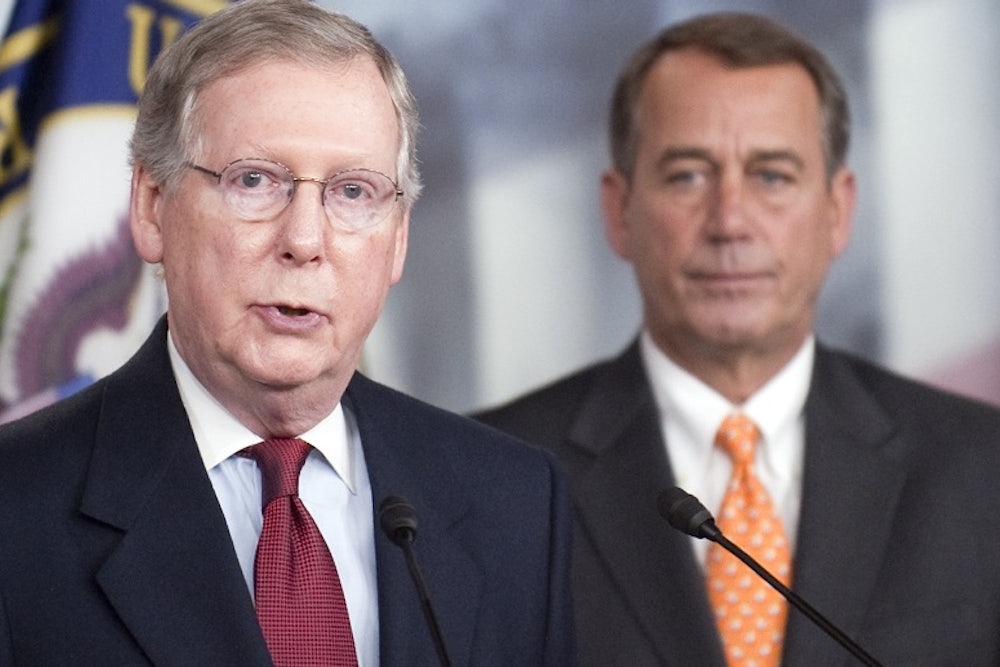If Republicans capture the Senate, they can accomplish big things, Senator Rob Portman told The Atlantic in an article published Monday. “We need the majority for the sake of the country for the next two years, but it’s also about having a proactive, positive Republican agenda to take to the American people in 2016,” he said, citing issues like tax reform, a grand bargain on the long-term budget, and a compromise on an energy bill. He’s not the only ones with high hopes for a Republican-controlled Congress. Kevin McCarthy, the new House Majority Leader, told Politico that if the GOP takes the Senate, as expected, he wants to show that the Republican Party can govern by reforming government agencies and eliminating hostile budget fights. “My belief is you have one chance to make a first impression,” he said. “From the very first day after the election, we should be laying out to the American public what the expectations are. Why make two different agendas?”
Remarks like these have some in Washington hoping that there will be less last-minute dealmaking and more progress on major legislation during Barack Obama’s final two years in office. But don’t count on it. The political roadblocks that have made legislating all, but impossible during Obama’s second term aren’t going away. The 114th Congress will probably look a lot like the 113th.
McCarthy’s chief goal for the Republican Party is to prove that it can govern. Notably, he wants to avoid damaging standoffs over the budget. “If we are fortunate to have both majorities, take away any cliff you can have hanging out there,” he said. “If you have a cliff, it takes attention away. Why put cliffs up that hold us back from doing bigger policy?”
He's referring, specifically, to the 2013 “fiscal cliff” showdown that shut down the government. It would certainly be good to keep the government open. But it’s even more important to eliminate debt ceiling brinkmanship, and it’s unclear if McCarthy intends to allow clean debt ceiling votes (as opposed to demanding steep concessions, like those that lead to the shutdown). If so, that would be a major improvement over the past two years. But it also is hard to imagine. The far-right bloc of House Republicans will likely still demand that Republicans use the debt ceiling as leverage to extract concessions from Obama. If the GOP takes the Senate, it may make them even more eager to do so.
McCarthy’s plan for the 114th Congress extends beyond avoiding fiscal catastrophe. He wants to prove that the party can govern. “If we don’t capture the House stronger, and the Senate, and prove we could govern, there won’t be a Republican president in 2016,” McCarthy told a group of donors, according to the Politico piece. That agenda would include renewing the tax extenders, passing an assortment of energy bills and tweaking the Affordable Care Act by repealing the medical device tax. He also wants to reform the Congressional committee structure and eliminate needless government agencies and bureaucracy. Some of those ideas have Democratic support and could make it into law. But none of them are major agreements on the budget or tax reform, for instance, as Portman suggests. (And it’s largely an agenda intended to appease business interests.)
That doesn’t mean those compromises are impossible. As The New Republic’s Brian Beutler wrote three weeks ago, Obama could cut some deals with House Speaker John Boehner and future Senate Majority Leader Mitch McConnell. But that would still involve Boehner and McConnell picking a fight with far right conservatives, including Senator Ted Cruz, who may be looking to secure his base of support for a presidential run. Those aren’t good conditions for a big agreement on any issue.
Don’t tell the editorial board at Bloomberg View that. In an editorial Sunday, they argued that a Republican majority should pass immigration reform, make new investments in infrastructure and stop obstructing Obamacare. The odds of that happening are infinitesimal, even if Republicans want to prove they can govern. In the Politico piece, for instance, McCarthy said that if Obama takes executive action on immigration reform after the midterms, it would “stop everything.”
House Republicans may really have so little trust in Obama that they refuse to make a deal with him on immigration. (Although Senator Chuck Schumer proposed a way around those trust issues by delaying the implementation of the bill until 2017, when Obama is out of office.) But the fact remains that the House GOP can pass its version of immigration reform, whatever that may be, whenever it wants because there is no filibuster in the House. But Republicans have been unable to coalesce around a plan for immigration reform among themselves, much less with the president. If they want to show they can govern, passing an immigration bill—any immigration bill—would be a good place to start. As with other major issues, though, Republicans find it easier to say they can govern than to actually do it.
